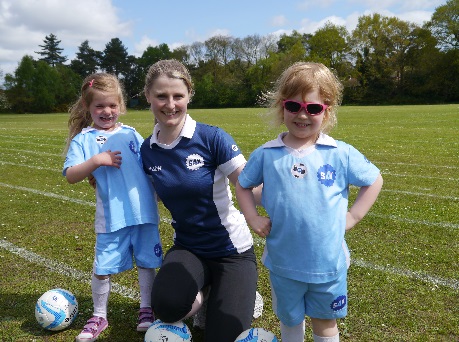
If you research the history of women’s football, you will see that role models have been instrumental in the establishment of the womens game. Nettie Honeyball pioneered women’s football in the 1890s and Lily Parr who played for Dick, Kerr’s Ladies, was one of the first women footballers to be inducted into the Football Hall of Fame.
This idea of role models is extremely important. Research has demonstrated that young people are critically influenced by role models and classes that feature female coaches would therefore be beneficial to girls and young women. A recent Girls in Sport project used female students to carry out fun and interactive sessions in order to tackle the problem of girls disliking PE and the project has been transforming PE departments across the country.
This is why at S4K we are actively encouraging girls and girl coaches to be part of our team. From toddlers to older girls there is a need for role models and pro-active support and we always aim to balance the genders in our coaching teams. So if there are any volunteers out there we would be more than welcome to receive a helping hand to get this right.
While boys and girls can be quite similar when at the age of tots and toddlers, differences rapidly emerge. Boys can be quite content in engaging in more rough interactions, while girls prefer to sit and observe their surroundings. It is imperative that parents allow their children, no matter what their age to participate in sports games and activities, in order to improve their communication skills, confidence and most of all, health.
Once girls reach the pre-teen years, they become more aware of their bodies and develop different views of their bodies and their abilities in sport. In order for sports institutions to succeed in persuading girls to participate in sports, the stereotypes with regards to their femininity need to be addressed. Various studies have found that if girls are encouraged to participate in sport from an early age and taught to engage with their peers, these feelings of insecurity may be lessened in later age.
Participation in sport increases not only physical, but psychological well-being, particularly in girls. During difficult times, sport can be the one area of comfort and consistency that can feature throughout a girls’ life, from toddler to youngster, through pre-teens and teens to womanhood.
The time has arrived to encourage young girls and women to explore the psychological, physical and emotional benefits that sport has to offer. Hopefully, girls’ perception of sport is changing and with the London 2012 Olympic Games, more girls will be taking up sport and taking the skills that they develop through to adulthood.
We champion girls sport, soccer and football at Sport4Kids – click here to find your nearest development centre.

 Cricket Classes
Cricket Classes Dance Classes
Dance Classes Family Events
Family Events Football Academy
Football Academy Football Classes
Football Classes Football Tournaments
Football Tournaments Golf Classes
Golf Classes Holiday Camps
Holiday Camps  Rugby Classes
Rugby Classes Tennis Classes
Tennis Classes